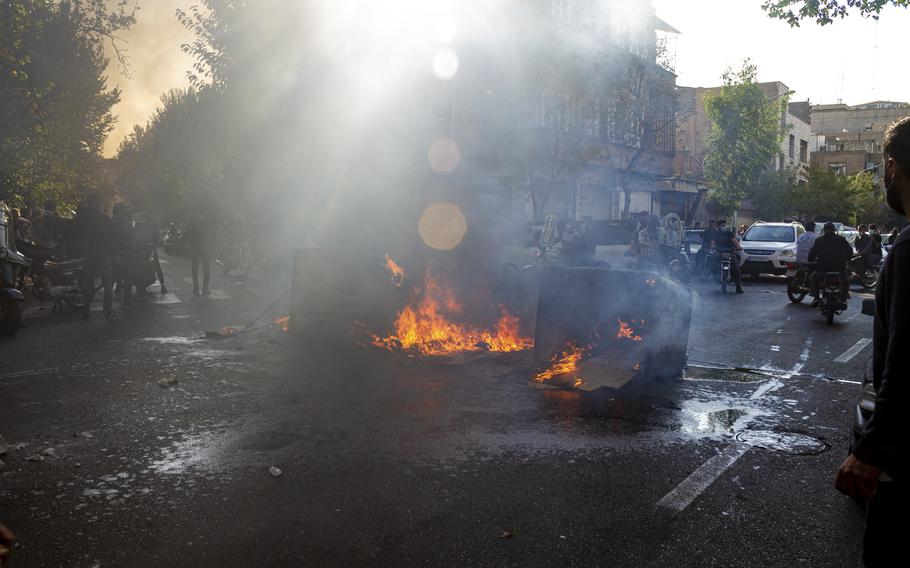
The U.S. military is prepared to take action to defend American troops and allies in the Middle East, following a media report that Iran could be preparing attacks against Saudi Arabia and Iraq, national security and defense officials said Tuesday.
Saudi intelligence has found Tehran is plotting diversionary attacks in both countries to take the focus off ongoing turmoil in Iran, which has been happening for weeks and grew more intense after the death a 22-year-old woman who was arrested by police for purportedly violating the Islamic regime’s strict dress code, The Wall Street Journal reported.
The Saudi intelligence was passed on to U.S. officials, the report said.
“We are concerned about the threat picture,” a spokesperson for the National Security Council said in a statement Tuesday. “And we remain in constant contact through military and intelligence channels with the Saudis.”
“We will not hesitate to act in the defense of our interests and partners in the region,” the spokesperson added.
Protests stemming from Mahsa Amini’s death in September began in Iran and spread to other nations, and the incident again has drawn attention to Tehran’s human rights record.
According to The Wall Street Journal report, Iran has been looking for a way to deflect attention away from its domestic problems. Saudi Arabia, located just across the Persian Gulf from Iran, has long been at odds with Tehran over numerous issues, as has neighboring Iraq. At least one of the purported Iranian targets is Erbil in northern Iraq, where U.S. troops are stationed.
As a result, the report said, U.S. and Saudi military officials elevated their alert statuses in the region, as did militaries in neighboring countries.
Defense Department officials on Tuesday did not confirm Saudi intelligence indicating future attacks from Iran. But remarks from U.S. officials indicated an active and fluid situation.
“We are constantly monitoring threat streams in the region and we remain in constant contact with our partners in the region, to include the armed forces of Saudi Arabia,” Army Col. Joe Buccino, spokesman for U.S. Central Command, said in a statement.
Iran has already carried out missile and drone attacks in northern Iraq in recent weeks. In late September, Tehran targeted the headquarters of three Iranian Kurdish opposition parties that support the ongoing protests in Iran. The attacks killed and wounded dozens of people.
Iran also has been helping the Russian military in Ukraine recently, including supplying drones. Some experts have said this also was at least partly motivated by the social dissent inside Iran.
Air Force Brig. Gen. Pat Ryder, the Pentagon’s top spokesman, underscored unconditional support for American troops and allies in the Middle East during a briefing Tuesday and said defense leaders are now keeping a close eye on potential threats from Iran.
“We are in regular contact with our … partners in terms of what information they have to provide on that front,” he told reporters. “We have said before, and I’ll repeat it … we will reserve the right to protect and defend ourselves no matter where our forces are serving, whether in Iraq or elsewhere.”
New Iraqi Prime Minister Mohammed Shia al-Sudani said earlier Tuesday that he wants to keep hosting talks between Saudi Arabia and Iran. Saudi Arabia has sought talks with Iran as the kingdom tries to end its yearslong war in Yemen against Iran-backed Houthi rebels.
President Joe Biden traveled to Saudi Arabia in July to meet with King Salman and Crown Prince Mohammed bin Salman as a show of support for U.S.-Saudi relations.
This week, Saudi officials reiterated support for a recent decision by the Saudi-led OPEC cartel to cut oil production beginning in November by 2 million barrels per day. U.S. officials criticized Saudi Arabia for supporting the cuts, with some saying the kingdom is siding with Russia President Vladimir Putin by doing so — as Russia’s ongoing war in Ukraine continues to heavily impact energy supplies worldwide, including oil and gasoline.
“I think at the end of the day, we are facing an economic uncertainty globally,” Amos Hochstein, the U.S. envoy for international energy affairs, said Monday. “Energy prices have to be priced in a way that allow for economic growth.
“And if they are not … they will rise too high and accelerate an economic downturn, which ultimately is the one thing that will be terrible for energy demand itself.”
